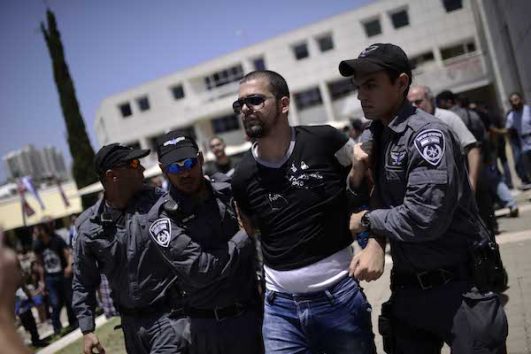Even when brutality is documented, Palestinians must live with the knowledge that they are unlikely to receive truth, justice, or respect from the authorities that claim to serve them.

In the wake of a video released last Thursday showing an Israeli police officer assaulting a Palestinian truck driver in East Jerusalem, Police Commissioner Roni Alsheikh stated that it was “difficult to find any justification whatsoever” for the policeman’s behavior, and assured the public that the officer would be dismissed. “This is an irregular incident that has no place in the Israel Police,” he insisted.
Alsheikh’s attempt to portray the event as essentially a problem of “a few bad apples” is disingenuous. According to Ynet, the policeman from the video was investigated over another violent incident four years ago, but the file was closed by the Police Investigation Unit (“Mahash”). His case appears to be one of the 10,492 complaints of police brutality and misconduct filed from 2011 to 2014 — 93 percent of all complaints filed during those years — which were dismissed without punishment. If the officer was indeed a “bad apple” as Alsheikh suggests, the authorities clearly had no problem with throwing him back into the barrel.
It was fortunate that the incident in Jerusalem was captured on camera, but that is not always enough to secure justice for brutality by the police or the army. In November 2014, despite a security camera showing that policemen fired unjustifiably at Kheir Hamdan in Kufr Kanna, the officers were never brought to trial.
In the case of Elor Azaria, who was recorded executing a wounded Palestinian attacker while he was lying on the ground in Hebron, the court played down his conviction as manslaughter and sentenced him to only eighteen months in prison. Despite extensive documentation of excessive force during protests, almost no police officer is ever charged. The list goes on.
This backdrop of impunity is probably one of the reasons why, despite the officer’s maniacal outburst, none of the Palestinian men in the video dared to hit him back in the same manner. Every one of them is mindful that the officer could easily arrest them, or worse, pull out and fire his gun. The officer might claim that the men ganged up on him and that he acted in self-defense — and the police would have believed him. If the men walked free, police units might raid their homes claiming that the residents were criminals or terrorists — and the media would have believed them.
Thursday’s video thus captures a more subtle but pervasive aspect of Palestinians’ experience of state violence. It’s the knowledge that, even if you have done nothing wrong, you are unlikely to receive truth, justice, or respect from the authorities that claim to serve you. It’s the same knowledge shared by black Americans who are mindful of their every move when interacting with the police, wary that the slightest suspicion — most often inferred from the mere color of their skin — can be enough to get shot.
As such, the Jerusalem video offers a glimpse into the realities of a city that imposes armed officers, backed by the power of the state, upon a discriminated and oppressed population who are seen and treated as menaces and enemies. The only “irregularity” in this case is that the police commissioner could no longer provide a cover for the officer to carry out his usual work.


